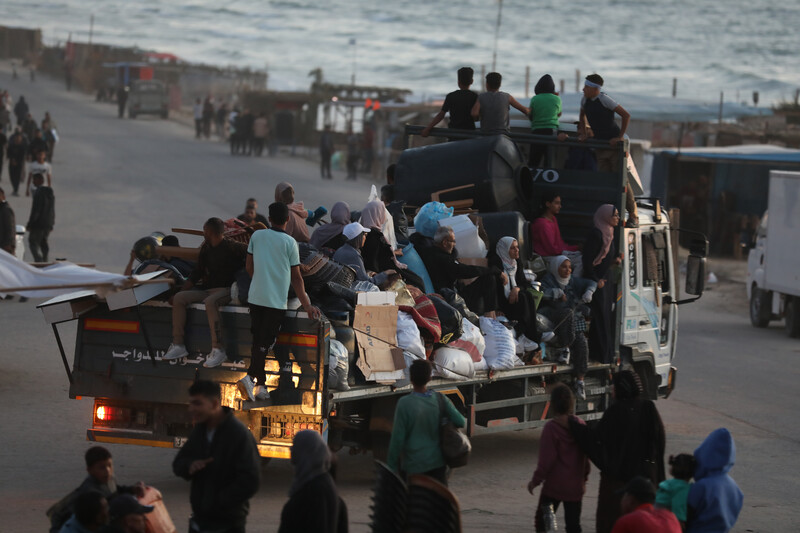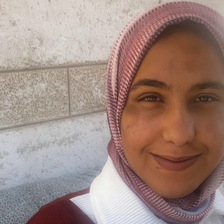23 May 2024

The displaced in Gaza have been forced to move countless times, here after yet another Israeli evacuation order in the central Gaza Strip on 6 May 2024.
APA imagesOn 15 April, Rania, 37, returned home with her four children to Jabaliya refugee camp in the north of the Gaza Strip.
This was before the current fighting in Jabaliya and at a time when the Israeli military felt confident – again – that it had pacified the north through imposed famine and carpet bombing.
For six months prior, Rania’s family had been displaced to Deir al-Balah in central Gaza, though without Rania’s husband, Zahy, 42, who, while insisting his wife and children leave when the Israeli military demanded that people evacuate from the north, also insisted on staying in their home.
Rania made her decision early in the morning when she woke up to news that the Israeli military was allowing women and children under 15, as well as older people, to return north.
She cried from happiness and rushed to wake up her children to pack some clothing. Then they got in the car of a relative who took them to Wadi Gaza, which separates the south from the north.
On the way to the checkpoint, Rania saw families walking carrying their belongings, others on the back of trucks or donkey carts. Some men were riding bicycles.
When she arrived at the checkpoint just after 6 am, she was surprised to find only a few soldiers. The area was not surrounded by tanks and there were no warplanes or drones in the sky.
“The soldiers allowed me and my children to return home,” Rania told The Electronic Intifada over the phone. “They allowed many tens of women and children to return, but they refused the men. I saw many women and children go home without their men.”
Reunited
Their stay in Deir al-Balah had been exhausting, Rania said, and was marked with several displacements to avoid the heavy bombardments in Deir-al Balah, despite Israeli assertions that it was a “safe zone.”
“We got tired of constant displacement,” she said.
They had been lucky. Several houses in the area they had first stayed were destroyed in the bombings, but the one she and her children were in had escaped damage. They moved away for safety, eventually finding themselves in a school, then, after a one-day Israeli incursion, another house, before moving back to the first house even though it was on the eastern edge of the town and closer to the Israeli positions.
“We had no option but to return to the first house we were displaced from,” Rania said.
“It was bad enough to be separated from my husband, who was the only shoulder that we used to lean on. My children and I didn’t feel safe in his absence all those months.”
That also explained why she was so keen to return north, despite the potential danger in getting there and being there.
“I was not afraid to be killed while trying to return, because I was determined to get back home to my husband, even at the cost of our souls. Death is better than remaining displaced.”
Zahy was waiting for them 200 meters from the checkpoint. Once her children saw their dad, they ran to him.
“They immediately dropped my hands and ran toward him and threw themselves in his embrace. ‘We missed you badly,’ they told him. ‘We were not okay without you. Don’t leave us again baba.’”
Rania said she couldn’t stop herself from crying and said she was determined not to allow the family to be separated again.
“My husband had no choice but to stay and protect our land from being stolen by the Israeli occupation … We want to live together here in our home, even if under bombardment. If we must, we will die together.”
In addition, she said, there is no place safe in Gaza. Everywhere is being bombed. And with some aid coming through in the north, it seemed a reasonable gamble.
“Why should we stay in the south?”
Separated
With the Israeli army preventing men from entering the north, Israa, 40, had to return with her five children to her home in Beit Lahia in the northeast of Gaza City without her husband, Nader, 43.
At first, she had refused to return without her husband. But he insisted. They had heard from neighbors that their home was still habitable, and he was adamant it was better for Israa and their children to live there than in the tent at an UNRWA school in the Nuseirat camp where they had taken shelter.
Reluctantly, Israa headed to the checkpoint with her children, who had cried when leaving their father. As she waited, he watched from 500 meters away.
After they crossed the checkpoint, Nader waved farewell and his eyes filled with tears, she told The Electronic Intifada.
On the other side, some of Israa’s relatives awaited her a few miles beyond the checkpoint and took them home on a donkey cart.
It was not what she had been led to expect. Neighbors had told her their home was still habitable. They hadn’t looked closely.
“When I returned, I saw some of the structure leveled to the ground. Windows were shattered. The doors were broken. Clothes were torn into shreds, furniture was broken under rubble. And many pieces of furniture were stolen,” she said.
Nevertheless, one room was still intact, and they used nylon to cover the shattered windows.
“My house is safer than anywhere else. But it would be warmer in the presence of my husband,” she told The Electronic Intifada. “I pray to God that Nader will join us as soon as possible.”
“I wish I hadn’t”
Immediately after Shireen Abu Serria learnt about the opening of the north, she phoned her husband.
Surprised and happy at the news, he made plans to meet her just near a checkpoint on Beach Street to welcome them back.
Shireen had been separated from her husband for five months when her and their three children moved south without him. He had wanted to go, but he feared being detained at the checkpoint like many other men had been, even if they had no affiliation to any factions of the Palestinian resistance.
Excited to see their father after a long separation, her children were impatient. They reached the checkpoint at 10:30 am. Shireen noticed that soldiers were turning away women with luggage so she left all her luggage near the checkpoint.
But her luck was still out.
At one point, hundreds of families started coming from the south toward the checkpoint where she was waiting, Shireen told The Electronic Intifada. The Israeli soldiers immediately stopped any movement at the checkpoint, and tanks edged forward toward the displaced people.
The situation got more chaotic. Tear gas was fired and Israeli jets and drones buzzed above the area, as shots and missiles were fired and dozens of people were injured. Several were killed.
Many people dropped to the ground. Some were wounded. Others panicked and began to flee.
Shireen kept her place, however, determined to cross the checkpoint.
“I was scared for my children, but I was desperate for them to get to their father. So me and some other women stayed where we were, despite the chaos in the hope that either we could sneak across or they would allow us to enter,” she told The Electronic Intifada.
“I wish I hadn’t.”
While trying to pass the checkpoint, more shots rang out. A bullet struck her daughter Najah in the face.
The four-year-old fell to the ground and was whisked away in a taxi that people at the checkpoint hailed.
She was taken to the Aqsa Martyrs’ hospital, but it was too late. She died before she saw her father.
“My daughter died because we wanted to go home,” Shireen said.
“She didn’t want to stay away from her father. She loved him and cried all the time when they separated,” Shireen said.
The mother buried her daughter in Deir al-Balah.
“Her father couldn’t even give her a farewell hug and kiss,” she said.
Khuloud Rabah Sulaiman is a journalist living in Gaza.





